How One Visit to Cuba Changed This Cuban-American's Views on the Trade Embargo
While most kids were playing with toys, Carmen Cusido was listening in to her family's discussions about policies between the U.S. and Cuba. Growing up Cuban in the U.S. - to Cuban exile parents - was an interesting experience.
"I remember a lot of my family members gathering around the family table talking about policies between the U.S. and Cuba and the lack of freedom of the press, lack of human rights and political prisoners," said Cusido, 31, who lives in Union City, N.J.
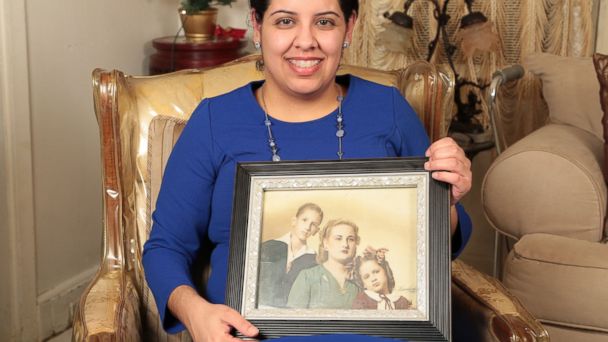
31 year-old Carmen Cusido changed her views on the 52-year-long Cuban embargo. Seen her holding a photo of her uncle, grandmother and mother in her home in Union City, N.J. Angel Canales/ABC News
Those conversations shaped Cusido's views about U.S. policy towards Cuba. She says she was a hardliner on U.S.-Cuba policy issues.
"I was the college student who had my door room walls peppered with Ronald Reagan quotes and anti-communism banners," said the freelance writer.

Carmen Cusido at the Cuban Parade in 2002 Union City, N.J. Courtesy of Carmen Cusido.
Both her parents fled Cuba over 50 years ago. Her father boarded a plane to New York and her mother left by boat to Spain in 1961. While Cusido respects and honors the pain and suffering her parents endured when they left the island, she still wanted to have a connection with Cuba.
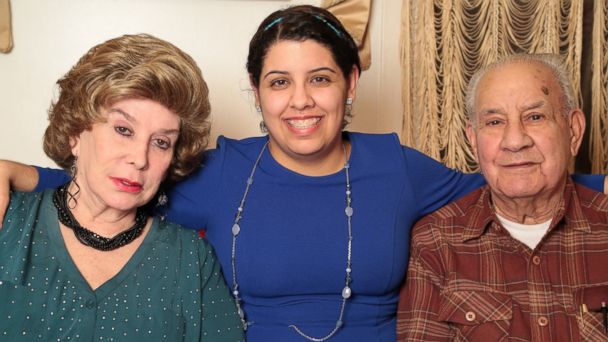
Carmen Cusido sitting with her mom Magaly Pacheco-Cusido and Armando Cusido in their home in Union City, N.J. Both of her parents fled the island in the 60's. Angel Canales/ABC News
It was a few years ago that Cusido started to think about visiting the island.
"As I was thinking more about the embargo against Cuba, I thought well maybe there will be an opportunity for me to come to visit my parents' homeland," she said.
A decade ago, Cusido recalls that she would have not dreamed of going to Cuba even if giving the opportunity.

Carmen Cusido at the US Interests Section in Havana, Nov. 2013. Courtesy of Carmen Cusido.
Her future plans to visit Cuba didn't sit well with her father.
"He said, 'I don't understand your need to visit Cuba. You're an American. Your roots are here. Why would you want to go to a country that has no freedom?'"
Her mother's reaction was more of caution.
"She said, 'I'm praying that you don't open your mouth too much and you don't cause much turbulence on the island,'" Cusido recalled.
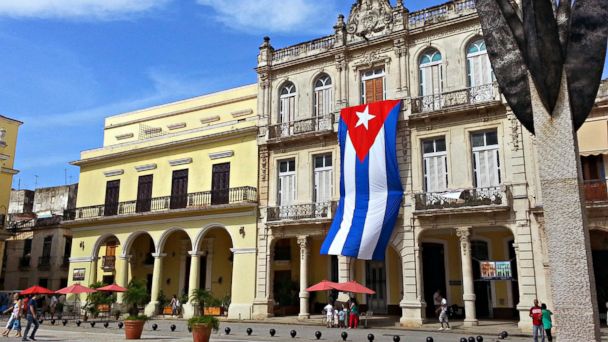
Cathedral Square in Old Havana, Nov. 2013. Courtesy of Carmen Cusido.
Cusido wanted to see things for herself and draw her own conclusions about Cuba, but also connect with her roots. Her visit to the island in November 2013 left a great impression on her views in regards to the U.S. embargo.
"It was a very emotional experience for me. I got to meet a cousin for the first time in my life. She embraced me like true family. Being able to see people that you heard about throughout the years was personally gratifying," she said.
She went to Cuba on a tour organized by Chamber of the Americas, a non-profit whose mission is to "facilitate commerce and understanding between the businesses and governments of the Western Hemisphere."
Being surrounded my relatives and other Cubans questioned Cusido's views on the embargo and the need to lift it.
"It's different when you get to visit real people and talk about their needs and their struggles and how we can help and there are so many of us that still have family there that yearn to see them, that yearn for these restrictions to be part of the past," she said.
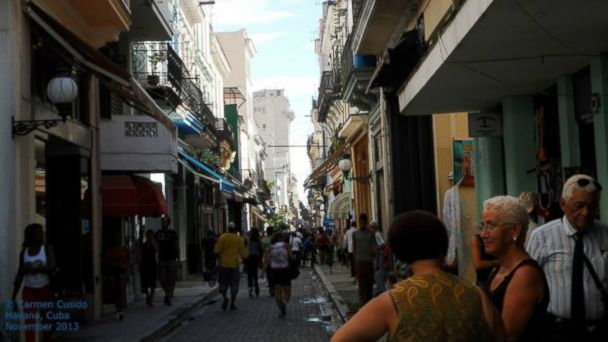
Cubans walking along Calle Obispo in Havana at 10 a.m. Cusido says, there are several people out of work. Courtesy Carmen Cusido
Throughout the years, her family had to come up with creative ways to send packages to their relatives in Cuba, she recalled.
While Cusido hasn't changed her mind on how she feels about the Cuban government, she has about the 52-year-old year embargo on the island.
"I remember growing up we had to send plenty of medical supplies to folks on the island. Even when I went last year, vitamins were a hot commodity. Cuban citizens don't have ready access to technology or even medicine in some cases," she said.
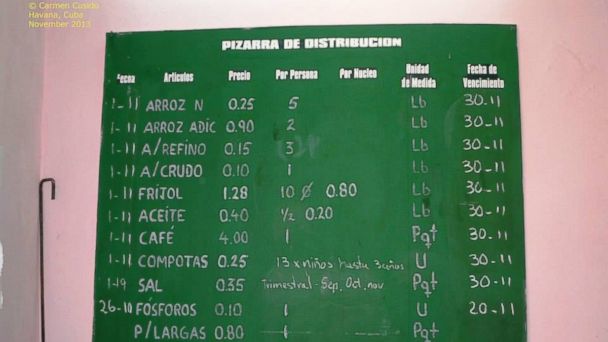
Food distribution board in Havana, Nov. 2013. Courtesy of Carmen Cusido.
While Cusido says that she is aware that Cuba is still oppressed and there are gross human rights abuses, she says that there have also been several economic reforms that have taken place on the island since 2008.
"The best way to pave the way for the Cuban people to have a representative democracy and free markets is to lift the embargo," she said.
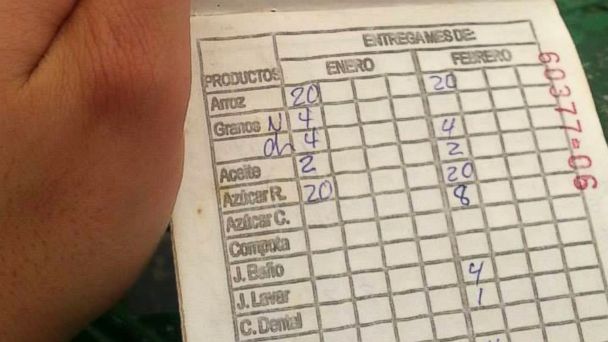
Grocery booklet for every Cuban household. Every family in Cuba needs to present this in order to retrieve their monthly allowance by the government. November 2013. Courtesy Carmen Cusido.
After her visit, Cusido thinks lifting the embargo is good for both the Cubans on the island and Cuban Americans.

A shot of Havana, Nov. 2013. Courtesy of Carmen Cusido.
"We have family that we have been yearning to see for so long." Her greatest hope is that by lifting the embargo, Cubans will soon see democracy," she said. "I'm hopeful that this is a positive step towards that goal."
Carmen Cusido is a freelance writer based in Union City, N.J., and a graduate of Columbia University's Graduate School of Journalism.